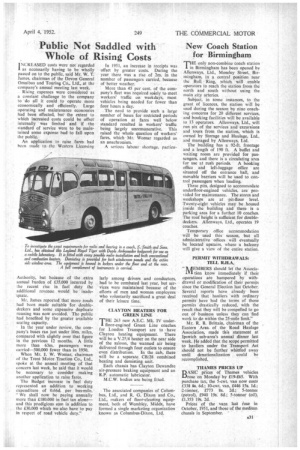Public Not Saddled with Whole of Rising Costs
Page 33

If you've noticed an error in this article please click here to report it so we can fix it.
INCREASED costs were not regarded Ias necessarily having to be wholly passed on to the public, said Mr. W. T. James, chairman of the Devon General Omnibus and Touring Co., Ltd., at the company's annual meeting last week.
• Rising expenses were considered as a constant challenge to the company to do all it could to operate more economically and efficiently. Large operating and maintenance economies had been effected, butthe extent to which increased costs could be offset internally was limited and if the standard of service were to be maintained some expense had to fall upon the public.
An application to raise fares had been made to the Western Licensing
Authority, but because of the extra annual burden of £35,000 incurred by the recent rise in fuel duty the additional revenue would. be inadequate.
Mr. James reported that more roads had been made suitable for doubledeckers and some expensive duplicate running was now avoided. The public had benefited by the greater available seating capacity.
In the year under review, the company's buses ran just under lOrn. miles, compared with slightly over that figure in the previous 12 months. A little more than 63m. passengers were carried-500,000 fewer than in 1950.
When Mr. J. W. Womar, chairman of the Trent Motor Traction Co., Ltd., spoke at the annual meeting of that concern last week, he said that it would be necessary to consider making another application to raise fares.
The Budget increase in fuel duty represented an addition to working expenditure of 0.66d. per bus-mile.
We shall now be paying annually more than £180,000 in fuel tax alone— and this ptodigious sum in addition to the £30,000 which we also have to pay in respect of road vehicle duty." In 1951, an increase in receipts was offset by greater costs. During the year there was a rise of •2m. in the number of passengers carried, because of better weather.
More than 45 per cent. of the company's fleet was required solely to meet workers' traffic on weekdays, most vehicles being needed for fewer than four hours a day.
The need to provide such a large number of buses for restricted periods of operation at fares well below standard resulted in workers' traffic being largely unremunerative. This raised the whole question of workers' fares, which Mr. Womar regarded as an anachronism.
A serious labour shortage, partial larly among drivers and conductors, had to be combated last year, but services were maintained because of the efforts of men and women employees who voluntarily sacrificed a great deal of their leisure time.
CLAYTON HEATERS FOR GREEN LINE THE 263 new A.E.C. Mk. IV under' floor-engined Green Line coaches for London Transport are to have Clayton heating equipment. There will be a V.25/4 heater on the near side of the saloon, the warmed air being delivered through four outlets to ensure
even. distribution. In the cab, there will be a separate CB/28 combined heating and demisting unit.
Each chassis has Clayton Dewandre air-pressure braking equipment and an R.P. automatic lubricator.
M.C.W. bodies arc being fitted.
The associated companies of Columbus, Ltd., and R. G. Dixon and Co., Ltd., makers of floor-cleaning equipment, both of Wembley, Middx, have formed a single marketing organization known as Columbus-Dixon, Ltd.
























































































